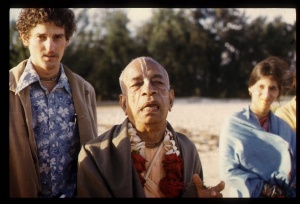SB 10.4.14: Difference between revisions
m (1 revision(s)) |
No edit summary |
||
| Line 1: | Line 1: | ||
{{info | {{info | ||
|speaker= | |speaker=Śukadeva Gosvāmī | ||
|listener=King | |listener=King Parīkṣit | ||
}} | }} | ||
[[Category:Srimad-Bhagavatam - Canto 10 Chapter 04]] | |||
[[Category:Bhagavatam Verses Spoken by Sukadeva Gosvami - Vanisource|100414]] | |||
<div style="float:left">'''[[Srimad-Bhagavatam]] - [[SB 10|Tenth Canto]] - [[SB 10.4: The Atrocities of King Kamsa|Chapter 4: The Atrocities of King Kaḿsa]]'''</div> | |||
<div style="float:right">[[File:Go-previous.png|link=SB 10.4.13]] '''[[SB 10.4.13]] - [[SB 10.4.15]]''' [[File:Go-next.png|link=SB 10.4.15]]</div> | |||
{{RandomImage}} | |||
==== TEXT 14 ==== | ==== TEXT 14 ==== | ||
<div | <div class="verse"> | ||
tayābhihitam ākarṇya | :tayābhihitam ākarṇya | ||
kaṁsaḥ parama-vismitaḥ | :kaṁsaḥ parama-vismitaḥ | ||
devakīṁ vasudevaṁ ca | :devakīṁ vasudevaṁ ca | ||
vimucya praśrito 'bravīt | :vimucya praśrito 'bravīt | ||
</div> | </div> | ||
| Line 17: | Line 22: | ||
==== SYNONYMS ==== | ==== SYNONYMS ==== | ||
<div | <div class="synonyms"> | ||
''tayā''—by the goddess Durgā; ''abhihitam''—the words spoken; ''ākarṇya''—by hearing; ''kaṁsaḥ''—Kaṁsa; ''parama-vismitaḥ''—was struck with wonder; ''devakīm''—unto Devakī; ''vasudevam ca''—and Vasudeva; ''vimucya''—releasing immediately; ''praśritaḥ''—with great humility; ''abravīt''—spoke as follows. | |||
</div> | </div> | ||
| Line 24: | Line 29: | ||
==== TRANSLATION ==== | ==== TRANSLATION ==== | ||
<div | <div class="translation"> | ||
After hearing the words of the goddess Durgā, Kaṁsa was struck with wonder. Thus he approached his sister Devakī and brother-in-law Vasudeva, released them immediately from their shackles, and very humbly spoke as follows. | After hearing the words of the goddess Durgā, Kaṁsa was struck with wonder. Thus he approached his sister Devakī and brother-in-law Vasudeva, released them immediately from their shackles, and very humbly spoke as follows. | ||
</div> | </div> | ||
| Line 31: | Line 36: | ||
==== PURPORT ==== | ==== PURPORT ==== | ||
<div | <div class="purport"> | ||
Kaṁsa was astonished because the goddess Durgā had become the daughter of Devakī. Since Devakī was a human being, how could the goddess Durgā become her daughter? This was one cause of his astonishment. Also, how is it that the eighth child of Devakī was a female? This also astonished him. Asuras are generally devotees of mother Durgā, Śakti, or of demigods, especially Lord Śiva. The appearance of Durgā in her original eight-armed feature, holding various weapons, immediately changed Kaṁsa's mind about Devakī's being an ordinary human. Devakī must have had some transcendental qualities; otherwise why would the goddess Durgā have taken birth from her womb? Under the circumstances, Kaṁsa, struck with wonder, wanted to compensate for his atrocities against his sister Devakī. | Kaṁsa was astonished because the goddess Durgā had become the daughter of Devakī. Since Devakī was a human being, how could the goddess Durgā become her daughter? This was one cause of his astonishment. Also, how is it that the eighth child of Devakī was a female? This also astonished him. ''Asuras'' are generally devotees of mother Durgā, Śakti, or of demigods, especially Lord Śiva. The appearance of Durgā in her original eight-armed feature, holding various weapons, immediately changed Kaṁsa's mind about Devakī's being an ordinary human. Devakī must have had some transcendental qualities; otherwise why would the goddess Durgā have taken birth from her womb? Under the circumstances, Kaṁsa, struck with wonder, wanted to compensate for his atrocities against his sister Devakī. | ||
</div> | </div> | ||
__NOTOC__ | |||
<div style="float:right; clear:both;">[[File:Go-previous.png|link=SB 10.4.13]] '''[[SB 10.4.13]] - [[SB 10.4.15]]''' [[File:Go-next.png|link=SB 10.4.15]]</div> | |||
__NOTOC__ | |||
__NOEDITSECTION__ | |||
Revision as of 03:38, 19 May 2021

A.C. Bhaktivedanta Swami Prabhupada
TEXT 14
- tayābhihitam ākarṇya
- kaṁsaḥ parama-vismitaḥ
- devakīṁ vasudevaṁ ca
- vimucya praśrito 'bravīt
SYNONYMS
tayā—by the goddess Durgā; abhihitam—the words spoken; ākarṇya—by hearing; kaṁsaḥ—Kaṁsa; parama-vismitaḥ—was struck with wonder; devakīm—unto Devakī; vasudevam ca—and Vasudeva; vimucya—releasing immediately; praśritaḥ—with great humility; abravīt—spoke as follows.
TRANSLATION
After hearing the words of the goddess Durgā, Kaṁsa was struck with wonder. Thus he approached his sister Devakī and brother-in-law Vasudeva, released them immediately from their shackles, and very humbly spoke as follows.
PURPORT
Kaṁsa was astonished because the goddess Durgā had become the daughter of Devakī. Since Devakī was a human being, how could the goddess Durgā become her daughter? This was one cause of his astonishment. Also, how is it that the eighth child of Devakī was a female? This also astonished him. Asuras are generally devotees of mother Durgā, Śakti, or of demigods, especially Lord Śiva. The appearance of Durgā in her original eight-armed feature, holding various weapons, immediately changed Kaṁsa's mind about Devakī's being an ordinary human. Devakī must have had some transcendental qualities; otherwise why would the goddess Durgā have taken birth from her womb? Under the circumstances, Kaṁsa, struck with wonder, wanted to compensate for his atrocities against his sister Devakī.